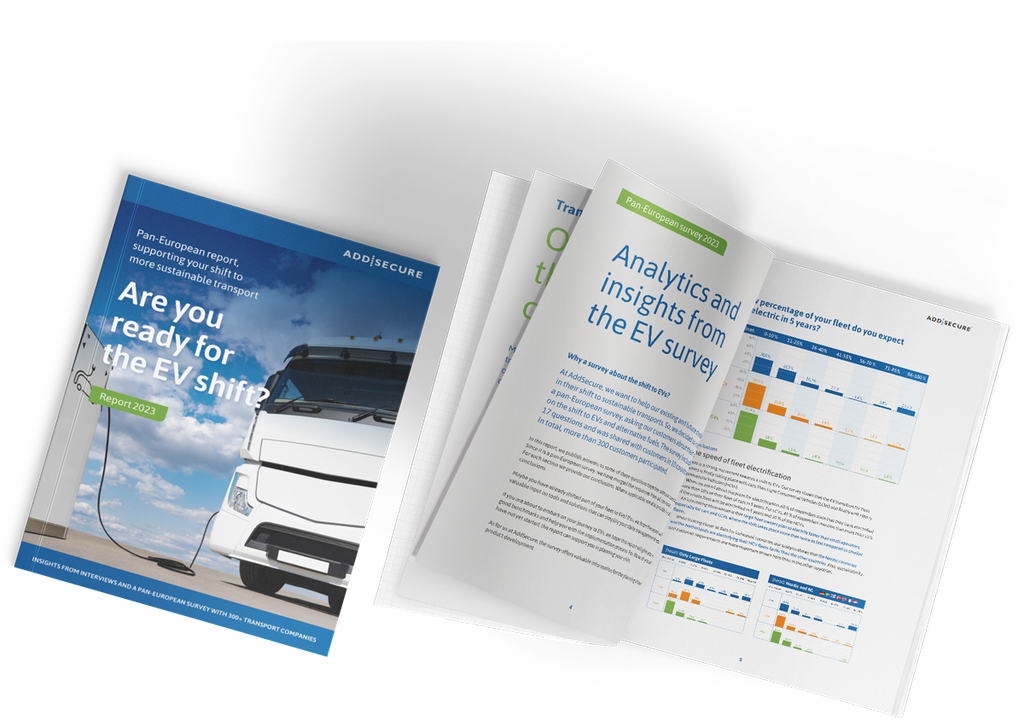How to navigate the new eco-system for electromobility
The shift to EVs is having a huge impact on the transport industry. Smart use of tools, processes, and planning and overall taking a holistic approach are key in the transition towards clean energy vehicles.
The move to clean energy vehicles is driving significant innovation and opportunities for companies to pivot their traditional fossil fuel-reliant operations model. To effectively optimize an EV fleet, companies need to assess their tools, processes, and overall planning. Ultimately, the shift to electrical vehicles promise an exciting and clean future for an industry that for so long has been seen as a large emitter of greenhouse gases.
Ulrika Allén is heading the Smart Transport product and technology teams at AddSecure. Here she shares her perspectives on the EV shift.

Transport companies who understand how to best navigate this new ecosystem will gain competitive advantages, achieve faster ROI, and thereby also win more business.
Ulrika Allén
VP Product and Technology, Smart Transport, AddSecure
What do you think fleet owners should consider in their shift to sustainable transports?
In general, I think it is important to take a holistic approach when fleets are electrified. This is crucial since the shift will impact many internal and external areas of the company. This includes considering which vehicles can be replaced with EVs and which routes are suitable for electrified transport. The shift will also have an impact on the end customers, who need to be open to more flexible slots for loading/offloading and renewed contracts with changed conditions. In addition, there are of course different financial aspects to handle, like higher upfront costs and tax incentives.
How can connected technology help support the shift to sustainable transports?
Systems for fleet and transport management can enable fleet managers to track and manage their EV fleet effectively and provide timely and accurate data to optimize the usage of electric vehicles. For efficient management of transport orders, the dispatcher needs an updated view of the state of charge, expected charging times, and remaining range for the vehicles. With this kind of information available, the most optimal vehicles can be selected for the assignments. Eco-driving functionality will still be of importance for electrical vehicles, to ensure that the EV range is optimized. Unplanned stops at public charging points are both costly and inconvenient.
What is AddSecure doing to support its customers in the transformation of their fleets?
Initially we are making relevant data from the vehicles available in our user portal to simplify the operation of
mixed-fuel fleets. Next we will enhance our solutions with third-party services for route and range optimization,
transport management and reports presenting which vehicles are suitable to replace with EVs.
In the transition to EVs, transport companies will be part of a new ecosystem for electromobility that is different
to the old landscape. Transport companies who understand how to best navigate this new ecosystem will gain competitive advantages, achieve faster ROI, and thereby also win more business.
Are there any other factors that are important for a profitable operation of EV fleets?
In the transition to EVs, transport companies will be part of a new ecosystem for electromobility that is different to the old landscape. In addition to vehicle manufacturers and technology partners like AddSecure, network and electricity providers, government authorities and charging infrastructure providers are important to operate an electrified fleet in a profitable way. Just think about it, by establishing a homebase charging infrastructure, the transport companies will control their own “gas stations”. This means that they will have a much higher control of the price of the electric “fuel”. I think transport companies who understand how to best navigate this new ecosystem will gain competitive advantages, achieve faster ROI, and thereby also win more business.
To learn more about what is required for a successful shift to EVs read the full Pan-European EV shift report, where you will also get a handy checklist.

Pan-European report supporting the shift to more sustainable transports
4 out of 5 transport companies in Europe want to shift to electric vehicles (EV) or alternative fuels in their fleet, according to our pan-European study. The main drivers for the transition to a more sustainable fleet are the companies' sustainability goals and requirements from customers. However, the study also identified four key challenges that these companies face in making the shift. Challenges that can be overcome with smart technology.
Read EV shift report